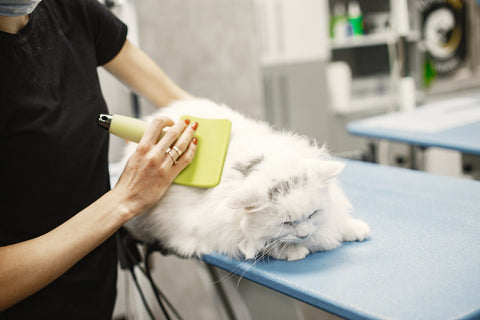
Dealing with Flea and Parasite Infestations
We know cats, especially those venturing outdoors, are susceptible to pesky invaders like fleas and parasites. But fear not! With the right preventative measures and grooming routine, you can keep your furry friend safe and sound.

Understanding the Threat: Fleas and parasites are not just a nuisance; they pose serious health risks to our cats. Fleas can cause discomfort, allergic reactions, and even transmit diseases. Parasites like ticks and mites can lead to skin irritation, anemia, and in severe cases, transmit dangerous illnesses such as Lyme disease or ehrlichiosis.
Prevention is Key:
- Flea Preventatives: Consult your veterinarian to determine the most suitable flea preventative for your cat. Options include spot-on treatments, oral medications, collars, and topical solutions. These products not only kill existing fleas but also prevent re-infestation.

- Regular Grooming: Brushing your cat regularly helps to remove fleas, flea dirt, and eggs from their fur. Additionally, it provides an opportunity to inspect your cat's skin for any signs of parasites or irritation.

- Indoor Environment Control: Keep your home clean by regularly vacuuming carpets, furniture, and pet bedding. Wash your cat's bedding frequently in hot water to eliminate any flea eggs or larvae.

- Outdoor Management: If your cat spends time outdoors, consider creating a flea-free zone in your yard by maintaining a tidy garden and using flea repellents or barriers.

Identifying Infestations: It's essential to recognize the signs of flea and parasite infestations early to take prompt action. Look out for:
- Excessive scratching, licking, or biting
- Visible fleas or flea dirt (black specks resembling ground pepper) in your cat's fur
- Skin irritation, redness, or hair loss
- Presence of ticks, mites, or other parasites on your cat's skin
Action Steps:
- Consult Your Vet: If you suspect a flea or parasite infestation, schedule a veterinary appointment promptly. Your vet can perform a thorough examination, recommend appropriate treatment, and advise on preventative measures.
- Follow Treatment Guidelines: Administer flea and parasite treatments as directed by your vet. Ensure consistency and completeness of the treatment regimen to eradicate the infestation effectively.
- Monitor Your Cat's Health: Keep a close eye on your cat's symptoms and overall well-being during and after treatment. Report any concerns or unexpected reactions to your veterinarian immediately.

Flea and parasite infestations are a common concern for cat owners, but with proactive measures and vigilant care, you can protect your feline companion from these unwelcome intruders. Remember to prioritize preventative measures, maintain a regular grooming routine, and seek veterinary guidance at the first sign of trouble. Together, let's ensure our cats stay happy, healthy, and flea-free!
